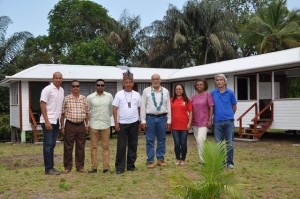[www.inewsguyana.com] – Minister of Finance, Dr. Ashni Singh, Minister of Amerindian Affairs, Pauline Sukhai and UNDP Resident Representative Khadija Musa today signed a $ 1.3B agreement that will facilitate Phase II of the Low Carbon Development Strategy (LCDS), Amerindian Development Fund (ADF) Project.
 The project is funded under the Guyana REDD+ Investment Fund and consequently is overseen by the Project Management Office in the Office of the President.
The project is funded under the Guyana REDD+ Investment Fund and consequently is overseen by the Project Management Office in the Office of the President.
The Project will provide funding to support the socio-economic development of Amerindian communities and villages through the implementation of their Community Development Plans (CDPs). Approximately 160 communities will benefit over three (3) years. The communities will receive funding of up to $5M each for the village’s development of a community based project. All CDPs are approved by consensus or majority vote at village meetings, governed by Section 32 of the Amerindian Act of 2006.
The United Nations Development Programme is providing technical support to the project, including, administration of social, fiduciary and environmental safeguards.
Projects are in the following seven sectors:
- Agriculture including; farming, agro-processing, aquaculture, poultry and cattle rearing
- Sustainable Forestry
- Village infrastructure including; construction of village office, multi-purpose building and sewing centre and upgrade of airstrip
- Manufacturing including; water purification plant, furniture, sanitary blocks and crafts
- Services including; village shop, museum building and bus / transportation
- Low Impact Mining
- Tourism including guest house, nature based and eco-tourism
During Phase l of the ADF project, 26 communities received disbursements to implement their respective CDPs. Phase l is near completion and the following has been achieved:
A few examples of CDPs implemented in Phase l, include the village of Santa Aratack, which used the funds to build a Guest House; the community had their official launch on September 6th, 2014. The guest house complements the community’s established offerings in ecotourism.
The village of Moraikobai completed rehabilitation works to their Multi-Purpose Centre and have acquired sewing machines (3), computers (2), printer (1), stove (1), freezer (1), kitchen utensils, etc. to equip the facility.
There were several villages that focused on agriculture in Phase l, including Kurukabaru where funding went to cattle rearing—construction of a ranch house and corral has been completed and a horse, cattle and medications have been purchased. In Rupertee village, five (5) acres of cassava has been planted and a processing facility has been completed.


